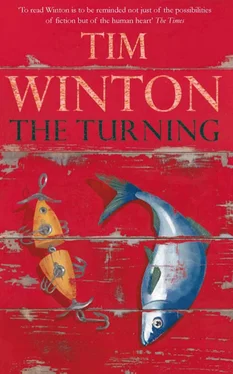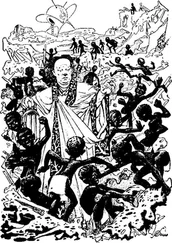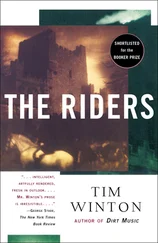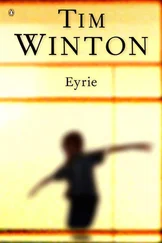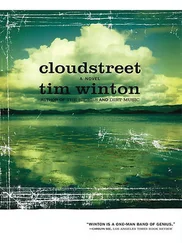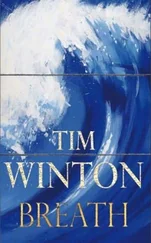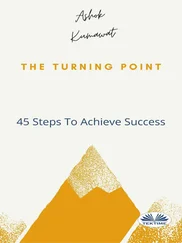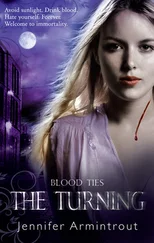We both got a fright, he said, trying to remember her name. I’m such a duffer. I’m sorry, I didn’t see you coming.
She was three — no, four — years old. She took such a long time to take a breath and make a sound.
The child’s name was Keira. Eventually she took his hand and they walked through the orchard in the dreamy latticework of shadows. A hundred yards away on a parallel course across the slope Daisy and Gail walked hand-in-hand along a separate row.
Are you looking forward to school? Vic asked.
I don’t know, said Keira.
I suppose you’ll go on a bus?
Or Daisy will drive me.
Yeah, or Daisy’ll drive you.
He realized he had no idea what to say to a child. Gail had nieces but he never saw them.
What happened to your face? said the girl. Did you fall off your bike?
Yes, he lied. I came a cropper.
What’s a cropper?
I. . I really fell off bad. I stacked it. I came a cropper.
Fenn’s fat, you know, said Keira. But it doesn’t matter.
No, he said, his voice catching. Nothing like that matters.
He wanted to hug her but he would only frighten her.
At the end of the ridge they waited for Daisy and Gail. Daisy took the child downhill in a long tumbling run toward the house.
You should have seen the pair of you, said Gail. You looked like Charles Windsor on a meet and greet.
She held my hand, he murmured.
Maybe she thought you’d get lost.
You ever regret not having them?
Ask me when I’m too old to have them. I’m not quite thirty-four, Vic. The door hasn’t shut yet.
He nodded and she saw that she’d surprised him. Something had got through. She just couldn’t be sure what it was.
I want to explain about that Aboriginal bloke.
What?
The bloke I knew as a kid.
Oh, yes, she said, wearily.
And he told her again about the basketball and the walks to the hostel and how the blackfellas bounced balls off the arses of their defeated escorts. And the confusion he felt, seeing their cheerful, cocky ringleader as a grown man. It wasn’t race, he said. Not quite. It was the jangling memory of a long drive to Perth when he was fourteen and not yet aware that his old man was beginning to go to pieces. There was the cough medicine he swigged and the rash of odd errands like this one, delivering a juvenile offender to Longmore. The prisoner was a dark, smouldering boy who pretended not to know Vic. His record was, according to Vic’s father, as long and spattered as a painter’s ladder. For five hours Vic sat beside him. The boy was uncuffed — unreachable, it seemed. And Vic was anxious, conflicted, afraid the whole time, long before the boy bolted at the last moment, at the very gate, whereupon he had to chase him down himself, dogging him like a fullback through a pine plantation until he got a tackle in and sprawled with him onto the bed of needles. The boy called him five kinds of fucking cunt while Vic held him there, not knowing what else to do until his father limped up, weeping with relief.
We never spoke about it, said Vic, and I never told Mum. I knew that I’d saved the old man’s bacon somehow. That time, anyway.
You shouldn’t have had to.
But the point is that when I saw that bloke again, this big lanky bugger, and he’s slapping his thigh and I’m trying to remember his name and all I can see is myself at fourteen, picking pine needles off my shirt and leading his little brother in cuffs to prison, I just felt sick. I couldn’t deal with it.
Vic, you are the fucking Book of Lamentations.
Oh. Yeah. Is Job in that?
She looked at his scabby face and grimaced. She didn’t know whether her rage was for him or against him.
I just needed to tell you, he said. That’s all I had to say.
Good, she said curtly, despite herself.
You know, our basketball coach was a Mormon.
Vic.
Actually there were two of them, Elder Harley and Elder Wendell. Yanks, of course. We hated them. They just turned up and wouldn’t go. In the end we burnt their bikes and hung them on a fence.
Hm. Novel.
Yeah, I spose it was.
Gail headed downhill at a pace she knew was uncompanionable. It was perverse to be disappointed by a lack of drama, the tears and screams and recriminations she’d dreaded, but she was strangely deflated. She would have preferred a burning bicycle, come to think of it, some straightforward conflagration.
They didn’t speak. All the way back to the house he hung at her elbow, kicking stones, panting a little, not quite matching her step for step.
On the lawn Fenn had a skeet trap set up. There was a shotgun broken over his arm. What’s this? said Gail.
Dad’s stuff, said Daisy. There’s boxes of those clay pigeon thingies in the shed.
I’m not much good, said Fenn. But, by God, it’s a lark.
Vic and Gail looked at one another.
You used to shoot, said Fenn. Didn’t you, Vic?
Vic looked at Keira who lay on a warped garden bench with an Archie comic. Daisy held the other child, a boy, who fished out one of her breasts and began feeding. He looked too big, too old, to be breastfed. Daisy sat on the bench beside Keira whose grubby feet rested against her little brother’s head.
Weren’t you in the army cadets? asked Daisy.
Yeah, said Vic. Believe it or not.
You want a go? asked Fenn who looked incongruous in his floral boardshorts and khaki disposal shirt.
I haven’t fired a weapon for thirty years, he said nervously. To tell you the truth I was a little creepy about it, once.
Vic remembered that Tasmanian kid a few years back, the way he calmly strolled about shooting tourists like they were some kind of sport. The chill of recognition he felt seeing the poor dumb kid’s face on TV. The dull eyes, the shoulder-length hair, the total confusion. It might have been him at fourteen or fifteen, gun-happy and afraid.
Dad used to shoot birds, said Daisy. The fruit, you know.
Is that thing still registered? asked Gail.
Love, you look horrified, said Fenn heartily.
There’s a rifle, too, said Daisy. Vet work, it’s different in the country.
We’ve never had to use it, yet, said Fenn. Thank God. You wouldn’t want to be the local RSPCA officer, though.
One side of the valley was dark now but the sun still lit the eastern slopes, bronzing the trees in their staggered lines.
But this, said Fenn. Trap-shooting. Nothing gets hurt but your eardrums.
You go ahead, said Vic.
Can I pull? said Keira.
Yeah, said Daisy. But you know the rules.
The little girl slid off the bench and rooted around in a box for a moment before pulling out a couple of pairs of earmuffs. She passed a set to her father and pulled some on herself. Vic felt Gail take his hand as Fenn loaded up from a carton on a rickety card table and faced out across the valley bottom.
Pull!
Two discs whirred out, climbing a while, only to sink into the valley untroubled by Fenn’s shots. The noise of the gun was quite shocking but the baby fed on, untroubled.
I suppose if he was any better at it, said Daisy, we wouldn’t be able to walk around next day collecting the skeet from the driveway for next time.
Still recyclers, said Fenn, stepping back to eject his shells onto the grass.
Doesn’t it stop your chooks from laying? asked Gail.
Daisy smiled.
The sound of Britney Spears, said Fenn, is the only thing I’ve noticed that puts those fowls off their game.
Come inside for a drink, Gail, said Daisy.
Gail let go Vic’s hand and went in with her. The boy, Amos, groaned sleepily, almost drunkenly, it seemed to Gail, as he lost the nipple. She closed the door behind them and let Daisy pour her a glass of homebrew. The gun went off again and again while they sat at the table beneath the window, the light dimming around them.
Читать дальше
